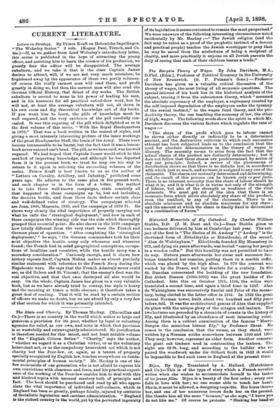The Bargain Theory of Wages. By John Davidson, M.A.,. D.Phil.
(Edin.), Professor of Political Economy in the University of New Brunswick. (G. P. Putnam's Sons.) — Professor Davidson has given us a valuable critical discussion of the theory of wages, the most living of all economic questions. The special interest of his book lies in the historical analysis of the subject, tracing it from the subsistence theory, which "assumed the absolute supremacy of the employer, a supremacy created by the seltimposed degradation of the employees under the tyranny of the sexual instinct," to the wages fund theory, and the pro- ductivity theory, the one teaching the economy of low, the other of high, wages. The following words show the spirit in which Mr. Davidson discusses the various factors which regulate the rate of wages :— " The share of the profit which goes to labour cannot be shown either directly or indirectly to be a determined amount, and the destructive criticism to which each successive attempt has been subjected leads us to the conclusion that the need for absolute determination in the theory of wages is illusory. The necessity seems to arise from the fact that the actual shares of the product are distinctly determinate ; but it does not follow that these shares are predetermined by action of any one principle. Indeed, a review of the phenomena of distribution shows us that there is no definite law, in accordance with which just so much, and no more, is assigned to any one of the claimants. The shares are mutually determined and determining, and the result of this process can be known only ex post facto. There is no inherent necessity that the share of labour should be what it is; and it is what it is in virtue not only of the strength of labour, but also of the strength or weakness of the rival claimants. We must get rid of the idea that there is an economic force which allots absolutely any share of the product, even the smallest, to any of the claimants. There is no absolute minimum and no absolute maximum for any share ; and the amount at which the share is finally fixed is determined by a combination of forces.'


































 Previous page
Previous page